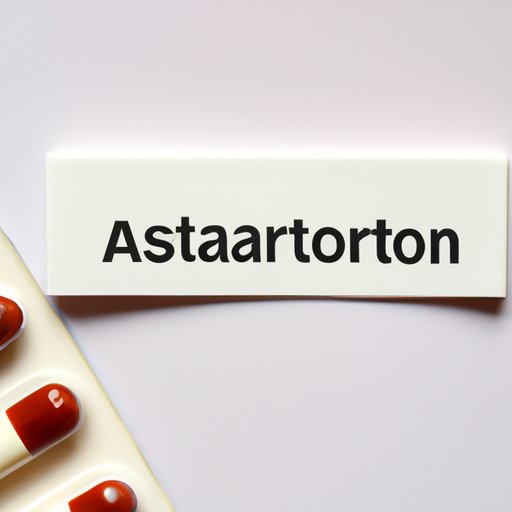
I. Introduction
If you take atorvastatin and notice weight gain, you might wonder if this medication is the cause. While atorvastatin is known to be effective at lowering cholesterol, some people report experiencing weight gain while taking it. In this article, we’ll explore the connection between atorvastatin and weight gain and provide tips for managing it.
Intended audience: This article is intended for individuals taking atorvastatin who are interested in understanding whether this medication can cause weight gain and how to manage it.
II. Overview of Atorvastatin
Atorvastatin is a medication that belongs to the class of drugs called statins. It is used to lower cholesterol levels by reducing the production of cholesterol in the liver. The medication works by inhibiting the enzyme HMG-CoA reductase, which plays a crucial role in the production of cholesterol in the liver.
Atorvastatin has been shown to be effective at reducing the risk of heart disease, heart attack, and stroke by lowering LDL or “bad” cholesterol levels. It can also increase HDL or “good” cholesterol levels, which helps to clear LDL cholesterol from the bloodstream.
Like any medication, atorvastatin can have side effects. The most common side effects include muscle pain, digestive problems, and rashes. However, in some cases, people may experience weight gain while taking this medication.
III. Correlation Between Atorvastatin and Weight Gain
Some research studies have found a link between atorvastatin and weight gain. One study published in the American Journal of Medicine found that patients taking atorvastatin gained an average of 0.44 kilograms (0.97 lbs) over a follow-up period of approximately 15 months. Another study published in the journal Diabetes, Metabolic Syndrome, and Obesity: Targets and Therapy found that 6.3% of patients taking atorvastatin experienced weight gain.
However, not all studies have found a significant association between atorvastatin and weight gain. A study of more than 18,000 patients published in the journal PLoS One found that although cholesterol-lowering statins were associated with weight gain, the effect was small and not clinically significant.
IV. Reasons Behind Atorvastatin-Induced Weight Gain
There are several possible reasons why some people experience weight gain while taking atorvastatin. One of the possible mechanisms is that statins can affect the metabolism of fat and glucose in the body, which can lead to weight gain.
Another possible explanation is that atorvastatin can affect appetite and food preferences. Some patients have reported increased hunger and cravings while taking the medication. Additionally, atorvastatin can cause changes in taste perception that may lead to an increased desire for sweets and carbohydrates.
V. Tips on Preventing and Managing Weight Gain
If you are concerned about weight gain while taking atorvastatin, there are several things you can do to manage it:
- Monitor your weight regularly: weigh yourself weekly or bi-weekly and keep track of any changes.
- Eat a healthy, balanced diet: focus on whole foods, fruits, vegetables, lean protein, and whole grains while avoiding processed foods.
- Stay active: regular exercise can help control weight while improving heart health and overall well-being.
- Limit alcohol consumption: alcohol is high in calories and can contribute to weight gain over time.
- Discuss medication options with your doctor: If you experience significant weight gain or other side effects while taking atorvastatin, talk to your doctor about other medication options.
VI. Comparing Atorvastatin with Other Cholesterol-Lowering Medications
There are several different types of cholesterol-lowering medications available. While all of these medications work by reducing LDL cholesterol levels in the bloodstream, some are more likely to cause weight gain than others.
For example, fibrates, a class of medications that lower triglycerides and raise HDL cholesterol, have been shown to cause weight gain in some patients. However, bile acid sequestrants, another medication used to lower cholesterol, are not associated with weight gain.
Your doctor can discuss the pros and cons of different cholesterol-lowering medications with you and help you choose the best option for your health needs.
VII. Case Studies of Real Patients
Here are some examples of real patients who have experienced weight gain while taking atorvastatin:
- Tom, age 58: Tom started taking atorvastatin after experiencing a heart attack. After a few months, he noticed that he had gained around 3 kilograms (6.6 lbs). Tom spoke to his doctor, who recommended that he make dietary changes and begin an exercise program. Tom lost the weight he had gained and has continued to maintain a healthy weight since then.
- Sandy, age 47: Sandy began taking atorvastatin after being diagnosed with high cholesterol. She noticed that she was constantly hungry and craved sweet foods. Sandy talked to her doctor, who recommended dietary changes and regular exercise. Despite these changes, Sandy continued to experience weight gain and switched to a different cholesterol-lowering medication.
VIII. Conclusion
While not all patients taking atorvastatin experience weight gain, it is a possibility, and it’s important to understand why this may happen and how to address it. Practical tips such as monitoring weight regularly, eating a healthy diet, staying active, and limiting alcohol consumption can all help prevent and manage weight gain while taking atorvastatin. If you are concerned about weight gain or any other side effects while taking atorvastatin, be sure to discuss these concerns with your doctor.





